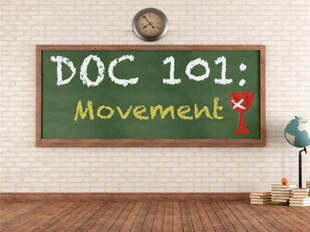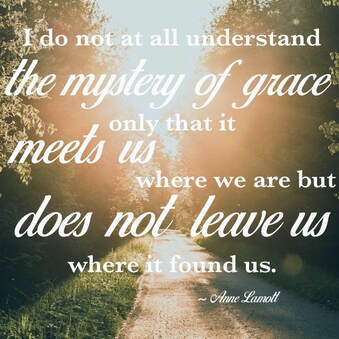Mosaic Christian Church of Peoria, IL
 I’ve learned some important things about God in my life. God is love. God always wants to be in relationship with me regardless of what I do. I’ve also learned that God is a God of Movement. God is always seeking me, leading me, and creating and shaping me in ways that lead me to and for other people. Yes, God is a God of Movement. I was born and raised in the Christian Church (Disciples of Christ). I was educated at Eureka College (a Disciples college.) I was trained at Lexington Theological Seminary (a Disciples seminary.) I was ordained in the DOC and served as a pastor of a small Disciples congregation in Rock Falls, Illinois for 8 years. Then, I left ministry and we meandered a bit through other denominations. I spent the last few years in the Mennnonite Church (USA) in which I discerned a call to return to pastoral ministry. And I love so much about the Mennonite Church. The Disciples of Christ is my "hometown". It’s the place that has most formed and shaped me and there are many things I love about it. Being part of this church is giving me an opportunity to rediscover some of things. And I’m very grateful for that. But though I have loved this denomination for a long time, I was never able to explain it very well. One thing that I discovered upon my return to the Disciples of Christ, is that I’m not alone in that! It turns out that many other people had the same issue. And over the last few years, the denomination has made a real effort to clarify some of our core values and create a statement of identity that is fairly easily understandable and shareable, and even better than all that - articulates really beautifully Who we are as Disciples of Christ. For the next few weeks we are going to be honing in on some different aspects of the identity statement on the front of your bulletin, “We are Disciples of Christ, a movement for wholeness in a fragmented world. As part of the one body of Christ we welcome all to the Lord’s Table as God has welcomed us.” As you can see, the word, “movement” is highlighted today and so we are going to start with talking about that. What does it mean to be a movement? I love that the identity statement starts like this because the first thing I think of when I think of the word, “Movement” is that that movement, first and foremost, implies LIFE. I think of the amoeba or one-celled organism that I first saw under a microscope in science class in 5th grade. And how that little amalgamous blob was moving and stretching. Or what it was like to see all the stuff in a drop of tap water. Or how mind-blowing it was to realize that a rock is full of atoms that are zapping around. The most steady thing that exists is actually moving! A dead thing does not move. A dying thing moves less and less. Movement is life. And God is the Life-giver. Thus, God is a God of movement. And spiritually we see that God is always moving God’s people in some fashion. In the scripture from Matthew today, we see the disciples after the resurrection. Jesus is gathering them on a a mountaintop here to give them instruction. We know from John that the disciples returned to the practice of fishing after Jesus rose from the dead, after he had come to them and breathed on them. (Remember the story of Peter’s restoration on the beach?) In other words, Jesus has already moved them from their old jobs to this mountaintop. From here He gives them another direction. Go, he says. Go out into the world. Make disciples. And that’s what they do. They share the good news about Jesus and there...is...movement! For 300 years, a nascent, living, burning faith spreads like wildfire across the Middle East and Asia Minor and Northern Africa and Southern Europe...even into India. It’s compelling and intriguing and it becomes threatening. Christians are targeted and persecuted. But that doesn’t stop the growth of the faith because… God is a God of Movement! Finally, a Roman emperor, named Constantine, comes along and, some say, was converted (others say he made a brilliant political move to align himself with a monotheistic religion that offered a means to “control” a stubborn, theologically unruly population.) The marriage of church and Empire takes the church from a movement to an institution. The church settles and becomes comfortable and static. Maintaining homeostasis and balance and equilibrium begins to set in. And over the next 1000 years, you see a lot of mistakes when we look at the institutional church. But don’t forget - God is a God of Movement. So if you cast your eyes just to the side of the history of the powerful and loud, if you look in the quiet places in the shadows and on the fringes, you see beautiful things happening. The Spirit calls people to commit their entire lives. Women and men vow to serve Jesus and then live like Jesus and take Christianity into the world. And where it goes as a Servant, instead of a Conqueror lives are changed. Where the people of God decide to disciple as a partner, where they submit themselves to each other and to those they are trying to reach you see hope awaken in people and a desire to know the living God. You see education, care for the poor, medical care, refuge for foreigners, schools, hospitals, art, music...all come from those fringes, those places in the margins, where they aren’t getting much attention or glory. But where God is moving. God is a God of movement. And as Christianity continues to thrive, God continues to move, continues to unsettle the institutions that attempt to solidify and restrain the Spirit. The invention of the printing press makes the Word of God available beyond a select few and the Reformation spreads across Europe so that, in the next 250 years, layers of philosophical ideas and theological discernment and ecclesial practice are shaped by fresh encounters with the Word of God and the discourse and discussion that came from that. As Disciples, this is where we trace our beginnings (though in reality, our beginning is with God moving across the waters at the beginning of creation because we never cease being what we once were.) The Reformation moves into Scotland and the Scottish Presbyterian movement marries an attempt to be quite literal with interpretation of the New Testament with a rationalism and emphasis on human logic that places the onus for understanding Scripture on each individual. As those folks come to America, they end up on the frontier. The rugged individualism of the frontier meshes very well with that theological understanding of each individual needing to encounter the Bible and be personally engaged with faith. And now we come to names you might recognize. Barton Stone is in Kentucky on the frontier and in 1801, he participates in a revival outside Lexington at Cane Ridge Kentucky where deeply intellectual, rigorous preaching meets movement-of-the-Spirit. Between 10,000-20,000 people, hungry for the living God are there. And the Spirit is moving! God is a God of movement. After Cane Ridge, Barton Stone and some other Presbyterian ministers break up with the Presbyterian church. They are concerned that there are extra-biblical requirements being put on church members that they simply can’t find in the New Testament. When they look at the Acts of the Apostles and read the Epistles, they see a community concerned with how they lived - what their lives both internally and externally looked like. And so Stone an dhis followers attempt to do that with groups of people that they simply called, “Christians”. At the same time, in West Virginia and western Pennsylvania, the Campbells - Thomas and Alexander - father and son- are also disagreeing with the Presbyterian leadership. They are reading the New Testament and seeing that the practices of the early church were fairly simple compared to what they had experienced as Presbyterians. They see the New Testament Church meeting together with the Lord’s Supper a part of every gathering. And they see people being baptised as adults (or young adults) being brought into the faith when they themselves could confess belief. And so the Campbells and their followers commit to holding onto to just what is necessary, according to the New Testament. And as they discern the “essentials” they agree that each congregation should be autonomous, the Table must be the center of worship, and that faith will demand “essentials” only which thus promotes unity. And these two movements find each other. There are significant differences - Stone’s movement is fairly free and focused on living-a-life-of-faith. The Campbells focus on a “systematic and rational reconstruction” of the New Testament Church. But both of them believe that trying to restore the early church will lead to freedom and that Unity is possible among Christians who have different practices but the same core beliefs. So - on Jan 1, 1832, the two movements come together with a handshake in Lexington, KY. Interestingly, they can’t agree on which name to use, so they brought both together (in an act of unity?) And we have been the Christian Church (Disciples of Christ) ever since. And from that beginning God moves these beliefs across the country. Soon little pockets of folks who want to know the Bible and encounter Jesus regularly in the act of communion begin claiming the name Christian or Disciples of Christ or both pop up everywhere. And the best of the Stone movement - simple actions and aligning life with the New Testament church emerge in these gatherings. And the best of the Campbells’ movement shows up in deep thinking and a willingness to seek unity. And you see that now when you look at the Best of Disciples. You also see us struggling to retain or, perhaps, reclaim our “movement” label. You see, God is a God of movement, and we have not been immune to the classic Christian errors of becoming comfortable and resisting being moved into territory that leads us to question our own actions or behaviors. When the Civil War occurs and the church begins examining the horrific error of slavery, many of the churches in the movement, especially in the South, don’t want to be corrected. So our movement fractures and the Church of Christ becomes the first offshoot. And then in the 1960s the church is empowered by the boom that led to the beginning of this congregation and others, and decides to create big, institutional structures right about the same time that institutions become suspect with Watergate and the Vietnam War and the Civil Rights movement. And the “denomination” becomes more important than the “movement.” God is a God of movement. And I love that there’s an effort afoot to reclaim and reimagine what it means to be Church - not only within the context of our larger church, but also at a local level. Within this congregation. Between you and me as we try to make this “movement” aspect of our Disciple identity a reality. (If you tuned out for the History lesson part of this, maybe tune back in for this section.) It is so critical that we understand that God is always moving us. There is just no such thing as static or stasis or even equilibrium. Even the things that have come before were the result of movement. So when we try to capture a moment, when we begin putting our trust in institutionalizing, God breaks us out - just like the Spirit moved in through the closed doors of the upper room, she comes again to us and moves through our churches. And that’s threatening to us. We just need to confess this. We prefer things to be understandable, familiar, predictable. God is a God of movement and that’s hard for us. It’s also incredibly freeing. We can recognize that what has come before us has shaped us. It has informed us. It may have blessed us deeply. But it doesn’t have to confine us. What we experience now and what comes next will be a movement of the Spirit. It’s up to us whether we want to see that as a curse, or a gift. I love that the passage from Matthew was suggested as a scripture in these identity resources. Because, as I said earlier, the context of this scripture is that the disciples had returned to what they knew. Even after they encountered the risen Lord. These were, arguably, some of the most faithful people of all time, who walked with Jesus for years and talked face-to-face with God. And STILL - they didn’t get that the God of movement was moving them. Jesus has to be really explicit with them. Go. Make disciples. (Not convert people - make disciples.) Disciple is from the same root as discipline. The word is disciplus- a learner, student, follower “dis” is “apart” and the “capere” is from the root “kap” which means to grasp. It implies understanding and time and dedication and devotion. It implies mental and physical energy. Go. Make. Disciples. All three of those words indicate a commitment to movement - physical, spiritual, intellectual. God is a God of movement Jesus gives the direction to his disciples and tells them to not only Go but to go everywhere to everyone - all nations - meaning all peoples. God wants the church to be available to every single person on Earth. And our Disciples belief is that every.single.person on earth is created by and for God. Every one. No exceptions. Go make disciples. That’s where our movement must be directed. And we have to be sure our movement is in the right place. Because there’s a caution for us when we confess God is the God of movement. God is the God of movement. That is true. But God is not a God of busy-ness or frenzy or self-serving movement motivated out of fear or anxiety or worry. God is a God of specific, called, blessed, and holy movement. If we are moving around doing things to build up our own comfort or recapture some experience we have had once - if we are trying to relive the glory days of our congregation, for example - we aren’t moving or spending our energy in the ways God calls us. And it’s really important for us to be very honest and intentional about that. We need to recognize that we have a lot of capacity to move in self-serving ways. We just need to look at the history of Christianity to see that there have been many times when we have spent enormous efforts and energies moving to entrench our comfort and our ideas and our desires. We’ve spent enormous efforts and energies moving in the opposite direction of where God wants us to go. So it’s just absolutely critically important to look for where the Spirit IS moving. As I said earlier - that’s probably not among the powerful, among the loud, among the visible. Oftentimes, the Spirit is moving in dramatic ways on the fringes - on the margins - among the weak, among the powerless, among the quiet, among the unseen. And our job as Disciples is to find where the Spirit moves and move with Her in Her work. God is a God of movement. We are Disciples - a movement for wholeness in this fragmented world. As we continue to explore our identity and continue to seek direction from God on where God would have us move, may we remember that we have confessed the Christ who tells us to Go. Go make disciples. Go invest ourselves with our whole hearts. Go seek the places where the healing and hope and reconciliation brought by the Spirit is happening and be part of that. And as we follow this God of movement, let us remember... that instruction to GO comes with a promise. God is a God of movement. And God promises to move with us. “Lo, I will be with you always even unto the end of the age.” God is a God of Movement - and God goes before us as we move. Even unto the end of the age. Thanks be to God. Amen.
0 Comments
 A living relationship with God is like... ... a journey of twists and turns. .... an adventure with highs and lows. ... a race requiring endurance and perseverance. Try it yourself and you will likely find - it's almost impossible to describe a living relationship with God without using words that indicate or describe activity, change, or growth. And there's good reason for that. God is a God of Movement. From the Spirit moving across the waters in Genesis, to the Christ calling the people to Eden Restored in Revelation, God is a God of movement. God moves towards us, seeking and finding us.Then God moves in us and through us and among us. God moves us away from conceit and selfishness. God moves us out of ourselves and towards others. Never does God allow us to remain stagnant or static or stale. Never does God cease shaping and forming us. Never does God stop working (no matter how incrementally small the work may appear to be) to make us through the Spirit into the likeness of Christ. Never are we left where we were found. God is a God of movement. Hallelujah. |
Rev. AprilPastor. Archives
November 2021
Categories
All
|
